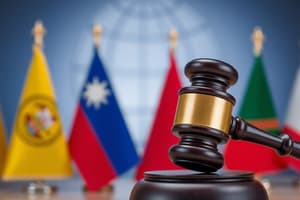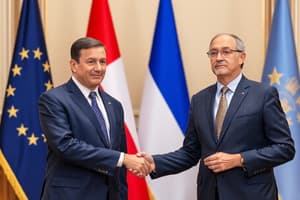Podcast
Questions and Answers
A diplomatic agent can be taken into custody by the receiving State without infringing the inviolability of his person or his residence.
A diplomatic agent can be taken into custody by the receiving State without infringing the inviolability of his person or his residence.
False (B)
A diplomatic agent can be forced to give evidence as a witness.
A diplomatic agent can be forced to give evidence as a witness.
False (B)
The sending State can waive the immunity of a diplomatic agent.
The sending State can waive the immunity of a diplomatic agent.
True (A)
A diplomatic agent is exempt from the jurisdiction of the sending State.
A diplomatic agent is exempt from the jurisdiction of the sending State.
A diplomatic agent can engage in professional or commercial activities in the receiving State without losing his immunity.
A diplomatic agent can engage in professional or commercial activities in the receiving State without losing his immunity.
Waiver of immunity from jurisdiction in respect of civil or administrative proceedings implies waiver of immunity in respect of the execution of the judgement.
Waiver of immunity from jurisdiction in respect of civil or administrative proceedings implies waiver of immunity in respect of the execution of the judgement.
The receiving State can initiate proceedings against a diplomatic agent without his consent.
The receiving State can initiate proceedings against a diplomatic agent without his consent.
The initiation of proceedings by a diplomatic agent precludes him from invoking immunity from jurisdiction in respect of a counterclaim.
The initiation of proceedings by a diplomatic agent precludes him from invoking immunity from jurisdiction in respect of a counterclaim.
A diplomatic agent who is a national of the receiving State enjoys full immunity from jurisdiction and inviolability for all their actions.
A diplomatic agent who is a national of the receiving State enjoys full immunity from jurisdiction and inviolability for all their actions.
Other members of the staff of the mission who are nationals of the receiving State have the same privileges and immunities as the diplomatic agent.
Other members of the staff of the mission who are nationals of the receiving State have the same privileges and immunities as the diplomatic agent.
A person entitled to privileges and immunities enjoys them from the moment they enter the territory of the receiving State.
A person entitled to privileges and immunities enjoys them from the moment they enter the territory of the receiving State.
Privileges and immunities of a person cease immediately when their functions come to an end.
Privileges and immunities of a person cease immediately when their functions come to an end.
Immunity from jurisdiction continues to subsist for acts performed by a diplomatic agent in the exercise of their functions even after they leave the country.
Immunity from jurisdiction continues to subsist for acts performed by a diplomatic agent in the exercise of their functions even after they leave the country.
The family members of a deceased diplomatic agent do not enjoy any privileges and immunities.
The family members of a deceased diplomatic agent do not enjoy any privileges and immunities.
The receiving State has no say in the privileges and immunities granted to diplomatic agents.
The receiving State has no say in the privileges and immunities granted to diplomatic agents.
Diplomatic agents who are nationals of the receiving State enjoy no immunity from jurisdiction.
Diplomatic agents who are nationals of the receiving State enjoy no immunity from jurisdiction.
Diplomatic agents can be inspected in the absence of the diplomatic agent or of his authorized representative.
Diplomatic agents can be inspected in the absence of the diplomatic agent or of his authorized representative.
Members of the family of a diplomatic agent forming part of his household who are nationals of the receiving State enjoy the privileges and immunities specified in articles 29 to 36.
Members of the family of a diplomatic agent forming part of his household who are nationals of the receiving State enjoy the privileges and immunities specified in articles 29 to 36.
Members of the administrative and technical staff of the mission who are nationals of the receiving State enjoy the privileges and immunities specified in articles 29 to 36.
Members of the administrative and technical staff of the mission who are nationals of the receiving State enjoy the privileges and immunities specified in articles 29 to 36.
Members of the service staff of the mission who are nationals of the receiving State enjoy immunity in respect of acts performed in the course of their duties.
Members of the service staff of the mission who are nationals of the receiving State enjoy immunity in respect of acts performed in the course of their duties.
Private servants of members of the mission who are nationals of the receiving State are exempt from dues and taxes on the emoluments they receive by reason of their employment.
Private servants of members of the mission who are nationals of the receiving State are exempt from dues and taxes on the emoluments they receive by reason of their employment.
Members of the administrative and technical staff of the mission enjoy immunity from civil and administrative jurisdiction of the receiving State for all acts.
Members of the administrative and technical staff of the mission enjoy immunity from civil and administrative jurisdiction of the receiving State for all acts.
Private servants of members of the mission may enjoy privileges and immunities to the same extent as members of the mission.
Private servants of members of the mission may enjoy privileges and immunities to the same extent as members of the mission.
The receiving State must exercise its jurisdiction over private servants of members of the mission in a manner that interferes with the performance of the functions of the mission.
The receiving State must exercise its jurisdiction over private servants of members of the mission in a manner that interferes with the performance of the functions of the mission.
Flashcards are hidden until you start studying




